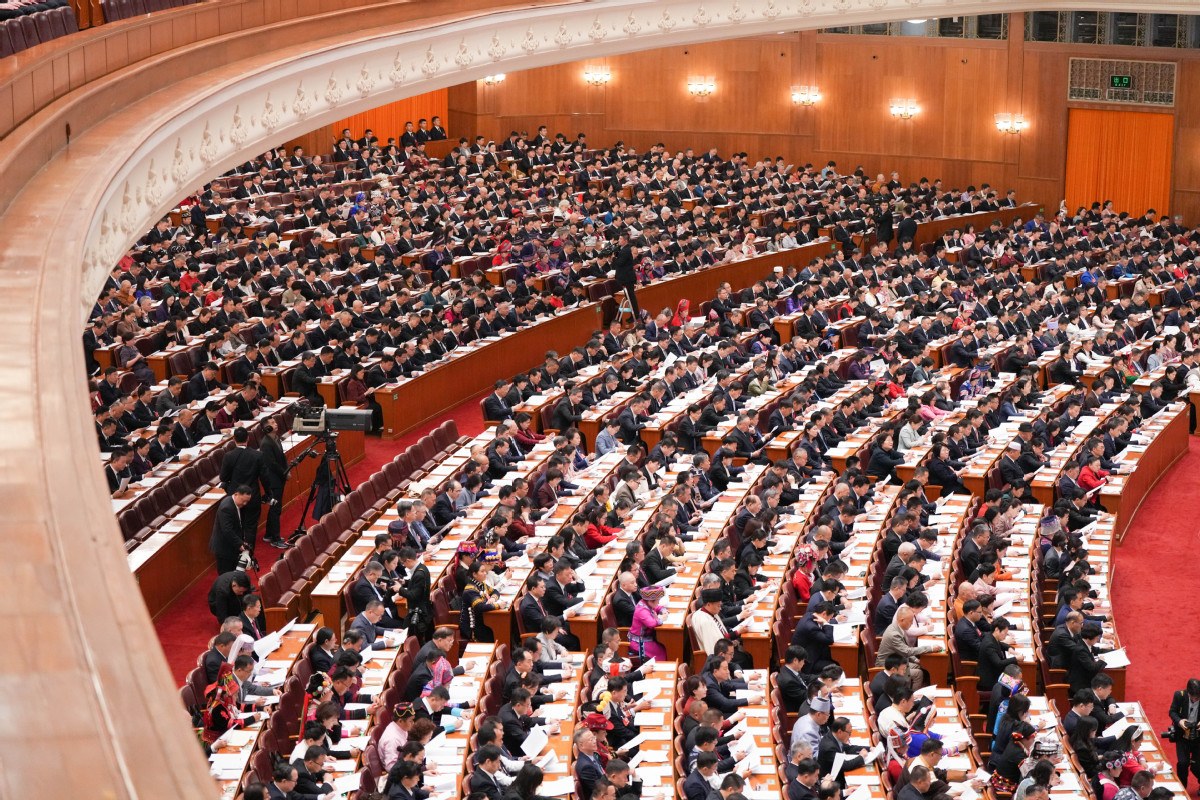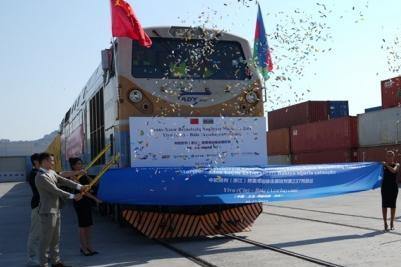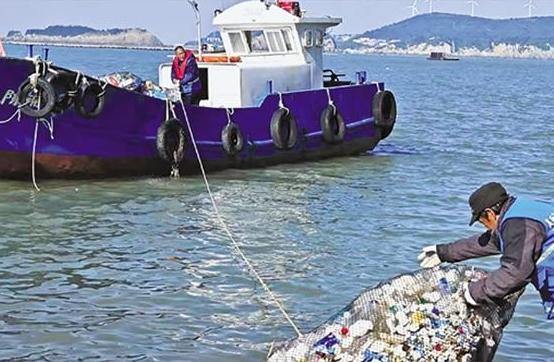
The opening meeting of the third session of the 14th National People's Congress is held at the Great Hall of the People in Beijing, March 5, 2025. [Photo/Xinhua]
Editor's note: How will China's economy develop and how will policies affect the outlook? Senior experts share their views on the Government Work Report delivered by Premier Li Qiang on Wednesday. Excerpts below:
Fiscal package comes as expected
By Robin Xing
Fiscal package came as expected: a 2 trillion yuan expansion with mild support on consumption. Policy focus is to accelerate AI adoption and autonomous driving, while make gradual progress in restructuring housing and local-government financing vehicles debt. We think tech animal spirits may return but broader reflation remains slow.
The augmented fiscal deficit for this year expanded by 2 trillion (or 1.1 percentage point of GDP, widening post the govt nominal GDP revision), in line with market expectations. Key drivers are: first, a rise in budget deficit from 3 percent of GDP to 4 percent; second, a renminbi 300 billion increase in long-term treasury bonds, to renminbi 1.3 trillion; and third, a renminbi 500 billion increase in local government special-purpose bonds quota, to renminbi 4.4 trillion.
The meeting pledges to bolster tech innovation by improving the market ecosystem, and increase support for AI applications and the new generation of intelligent terminals (NEVs, AI-enabled phones and PCs, and humanoids). It also emphasized the need to promote healthy development of the platform economy, as an effort to stabilize the job market and boost consumption.
Robin Xing, chief China economist with Morgan Stanley.
Pragmatic targets reflect resilience
By Zhao Zhongxiu
The government work report delivered by the premier fully expresses the tone of seeking progress while maintaining stability, enhancing the confidence and determination for high-quality development.
Setting several development goals for this year, the emphasis is on achieving a GDP growth of around 5 percent, a consumer price index increase of around 2 percent, and a reduction of about 3 percent in energy consumption per unit of GDP, reflecting the resilience and promising prospects of development.
The highlighted key tasks focus on an actively accommodative policy direction, such as increasing the fiscal deficit, expanding government investments, and issuing special government bonds. The report also emphasizes the development of new quality productive forces, including emerging industries like commercial aerospace and the low-altitude economy, nurturing future industries such as biomanufacturing, quantum technology, and 6G, accelerating the digital transformation and intelligent upgrading of the manufacturing industry to enhance development momentum.
Ensuring a solid foundation for economic and social development includes areas such as housing, ecology, employment, education, healthcare and social security. Noteworthy key tasks also include conducting specialized law enforcement actions to regulate business practices, purifying the market environment, intensifying efforts in the renovation of urban villages and dilapidated houses, and stimulating new demand in the existing economy.
Zhao Zhongxiu, president of the University of International Business and Economics.
Agricultural achievements offer valuable lessons
By Nii Quaye-Kumah
The Government Work Report presented by Premier Li Qiang at the opening of the third session of the 14th National People's Congress reaffirmed China's commitment to rural revitalization. It highlighted the continued prioritization of the "three rural" issues — agriculture, rural areas, and farmers, and underscored China's recognition that rural development is vital for national prosperity and global food security.
China's record-high grain output in 2024 highlights the effectiveness of its agricultural policies and investments. Achieved amid climate change and economic uncertainties, this success demonstrates the resilience of China's agricultural sector and offers valuable lessons for other nations.
At the International Fund for Agricultural Development (IFAD), we recognize China's approach as a model for addressing rural challenges. Through our upcoming Country Strategic Plan (2025-2030), the IFAD remains committed to supporting China's transition to prevent large-scale return to poverty and achieve long-term rural prosperity while facilitating knowledge exchange with other developing countries. The China-IFAD South-South and Triangular Cooperation (SSTC) Facility exemplifies this shared commitment.
I am also pleased that the government report emphasizes rural talent development. Young talents drive rural innovation, entrepreneurship, and sustainability by introducing technology and enhancing agricultural productivity. IFAD has supported these efforts in China through vocational training programs, agricultural extension services and aids for rural entrepreneurship. We welcome more policies that encourage young talents to contribute to rural vitalization, ensuring knowledge transfer and making rural livelihoods more attractive.
China's success in rural revitalization is a national achievement with global significance. By prioritizing food security, fostering innovation, building a resilient food system, and empowering rural populations, China continues to contribute to global poverty reduction. IFAD remains a dedicated partner, working alongside China to build a future of sustainable and inclusive rural prosperity.
Nii Quaye-Kumah, the International Fund for Agricultural Development's representative in China and head of Asia and the Pacific Regional Centre for South-South and Triangular Cooperation.
Inclusive approach reflected in trade with ASEAN
By Ong Tee Keat
In 2024, China managed to do well in navigating challenges confronting the various trans-border free-trade areas amid rising protectionism. The indiscriminate weaponization of tariffs against others deemed adversarial in the name of national interests and security emerged as a naked threat to the globalized free trade.
While the China-ASEAN Free Trade Area 3.0 Upgrade Protocol is well poised to be signed in the near future with the inclusion of consumer protection and competition provisions that are meant to enhance the quality of China-ASEAN free trade, the integral role of WTO-centered multilateral trading system should in no way be left incoherently compromised under the pan-securitization of cross-border trade by the collective West.
In this context, the Comprehensive and Progressive Agreement for Trans-Pacific Partnership looks set to be increasingly influenced by geopolitical considerations when the membership application of China is being brought for scrutiny. In contrast, China's prospects in advancing its model of egalitarian economic integration and inclusive multilateral cooperation seem to gain much momentum and headway in the developing Global South.
All in all, 2025 will mark a year of uncertainties brought about by the threat of tariffs, alongside throwing the global free trade governance into disarray. China remains the beacon of hope as to how it could ultimately pull off in the trading of tariff hikes initiated by the US administration, which is set to be instructive to the entire Global South, notably the BRICS-Plus.
Ong Tee Keat is president of the Belt and Road Initiative Caucus for Asia Pacific.
Green growth opportunities for the EU
By Michele Geraci
The report sets a GDP growth target of approximately 5 percent, reflecting a pragmatic approach to stabilizing the economy amid various challenges. These challenges include rising geopolitical tensions, and the need for structural reforms. The emphasis on achieving sustainable growth rather than focusing purely on rapid expansion is a significant and necessary shift in policy direction.
A central theme of the report is the focus on innovation and technological advancement. The Chinese government recognizes that transitioning from an investment-driven model to one that prioritizes high-tech industries and innovation is vital for maintaining competitiveness in the global market. This commitment to technological self-sufficiency is commendable, yet it must also be balanced with openness to international collaboration to foster innovation.
Moreover, I see great potential for enhanced cooperation between China and Europe, especially in the context of the EU's Green Deal. Collaborative efforts in renewable energy and sustainable development can create synergies that benefit both economies and contribute to global environmental goals.
However, challenges remain. The rise of protectionism and cautious approaches from Europe regarding trade and human rights necessitate constructive dialogue to address mutual concerns. Both China and Europe must engage in a nuanced discussion that fosters economic cooperation while respecting fundamental values.
In conclusion, the Government Work Report outlines a path toward sustainable growth and innovation for China. As we move forward, I am hopeful that both China and Europe can seize the opportunities for collaboration that lie ahead, ultimately leading to a prosperous and sustainable future for both regions.
Michele Geraci, former undersecretary of state at the Italian Ministry of Economic Development.
Future-oriented sectors align with Israel's expertise
By Iris Kastoriano
China's 2025 Government Work Report presents a clear and forward-thinking vision for the country's continued economic development, high-quality growth, and deepened global engagement. The comprehensive strategies outlined in the report highlight China's commitment to stability, innovation, and sustainable progress — values that have long defined China's remarkable development path. As China continues its journey toward modernization, there are growing opportunities for cooperation with Israel, particularly in areas of technology, trade, and environmental sustainability.
China's emphasis on developing new quality productive forces is particularly noteworthy. With a strong focus on artificial intelligence, biomanufacturing and green industries, China is once again demonstrating its ability to lead in future-oriented sectors. These advancements align with Israel's expertise in cutting-edge technology, and Israeli companies greatly admire China's ambitious vision. The potential for collaboration in research, industrial applications, and smart manufacturing is immense, offering mutual benefits as China strengthens its position as a global innovation hub.
The report also highlights China's dedication to green development and environmental protection, which is deeply inspiring. The country's remarkable progress in renewable energy, ecological conservation, and sustainable urbanization reflects a strong commitment to creating a better future. Israeli enterprises, particularly those specializing in water management, energy efficiency, and agricultural technology, look forward to contributing solutions that align with China's national priorities. Supporting China's green transition is not only an opportunity but also a responsibility that Israeli innovators hold in high regard.
Furthermore, China's efforts to advance high-standard opening-up are a testament to its confidence and leadership in global economic cooperation. The Belt and Road Initiative continues to be a vital platform for international trade, investment, and connectivity. Israeli businesses recognize the significance of this initiative and are eager to explore synergies in digital trade, logistics and financial technology. By participating in China's broader economic framework, international partners can benefit from China's dynamic and inclusive development model.
What stands out most in this year's report is China's unwavering commitment to progress while ensuring social and economic stability. The resilience and long-term strategic thinking that define China's approach continue to serve as an inspiration worldwide. As China moves forward, Israel remains a respectful and engaged partner, looking forward to continued dialogue, collaboration, and shared achievements that contribute to economic prosperity and technological advancement.
By aligning Israeli innovation with China's domestic demand expansion and consumption upgrading goals, the Israel Chamber of Commerce in China can play a pivotal role in fostering mutually beneficial economic growth and technological collaboration.
Iris Kastoriano, general manager of Israeli Chamber of Commerce in China.
Balancing and innovative road map shaping trajectory in 2025
By Muhammad Asif Noor
The Government Work Report delivered on Wednesday is a critical roadmap shaping China's trajectory in 2025. What sets this year's report apart is its emphasis on long-term structural adjustments, technological innovation, and economic stability, reflecting China's evolving approach toward sustaining high-quality growth in a world grappling with uncertainty.
The economic growth target of around 5 percent is a carefully calibrated projection that aligns with China's broader goal of maintaining a balance between economic expansion and structural reforms. This figure is not simply a numerical aspiration but a realistic goal for the country's ability to sustain growth while mitigating external shocks, particularly in a global economy facing inflationary pressures and geopolitical uncertainties. Unlike the past decades, where high-speed growth was the primary driver, China is now transitioning toward a high-quality development model where technological advancement, consumption-led growth and financial stability take precedence. The issuance of ultra-long special treasury bonds and increased local government spending highlight an evolving fiscal strategy that prioritizes economic resilience over short-term gains.
A significant aspect of the report is its focus on employment and social welfare, particularly the creation of over 12 million urban jobs and a commitment to maintaining a stable unemployment rate. Beyond the numbers, there is an understanding in China about the inclusiveness in economic prosperity. The report also emphasizes vocational training and digital economy readiness as another forward-looking perspective on workforce transformation. Unlike conventional economic models that rely solely on industrial expansion, China is fostering a knowledge-based workforce, positioning itself as a leader in emerging sectors such as AI, quantum computing, and 6G technology.
The commitment to agricultural modernization and rural revitalization is another pivotal aspect often overshadowed by the focus on industrial advancements. The expansion of soybean acreage, investment in high-tech agricultural practices, and efforts to stabilize grain prices are not merely domestic policies but strategic decisions to safeguard national food security amidst a changing global supply chain. With rising uncertainties in global agricultural markets, China's approach ensures long-term self-sufficiency while positioning itself as a major player in global food supply dynamics.
Furthermore, the emphasis on preventing poverty relapse is how China's policy continuity, reinforcing social stability as a cornerstone of economic progress.
Technological innovation remains at the core of China's development vision. Unlike previous years where infrastructure and manufacturing dominated the agenda, the 2025 Government Work Report places a significant emphasis on emerging industries and the digital economy. The focus on commercial space development, biomanufacturing, and embodied AI reflects a strategic pivot towards industries that will define the global economic landscape in the next decade. The increasing financial support mechanisms for future industries demonstrate that China is not merely catching up with technological trends but actively shaping them.
This Government Work Report is a reflection of China's evolving governance model as one that balances economic ambition with social stability, technological leadership with sustainability, and domestic resilience with global integration. The strategic clarity in this report indicates that China is not reacting to external pressures but proactively shaping its trajectory in a world that is increasingly uncertain. This comprehensive vision ensures that China remains a key driver of global economic trends, influencing markets, industries, and geopolitical landscapes for years to come.
Muhammad Asif Noor, founder of Friends of Belt and Road Initiative Forum, and a co-founder of the Alliance of China-Pakistan Research Centres.
The views don't necessarily reflect those of China Daily.
If you have a specific expertise, or would like to share your thought about our stories, then send us your writings at opinion@chinadaily.com.cn, and comment@chinadaily.com.cn.
Editor: Cheng Dengyu




